Yes, you can become a coder without a degree. The tech industry is expanding rapidly, with over 700,000 new tech jobs projected in the next decade. Many people ask, “How to become a coder without a coding degree?” The good news is that a traditional four-year degree is no longer a requirement to start a career in programming.
You can learn coding through online courses, bootcamps, and self-paced study. Many companies now hire based on skills and hands-on experience rather than formal education. Coders earn an average salary of $95,000 per year, making it a lucrative career choice, according to the Bureau of Labor Statistics (BLS). This guide will help you understand what coders do, the skills required, and the best steps to prepare for a successful coding career—without needing a degree.
Why You Don’t Need a Degree for Coding?
Many top tech companies, including Google, Apple, and IBM, focus on skills over degrees. Practical knowledge and problem-solving ability matter more than formal education. Today, there are many ways to learn coding, including:
- Online courses
- Coding bootcamps
- Interactive coding platforms
- Open-source projects
These resources help you gain real-world coding experience, making a degree unnecessary for most tech jobs.
In this video, discover how coding bootcamps offer a practical, hands-on path to becoming a coder from scratch. With mentorship, project-based learning, and tools for tracking progress, bootcamp programs help students build the skills and experience needed to enter the tech field confidently.
What Does a Coder Do?
A coder works in different areas of technology. Here are some common coding tasks:
- Writing code for new applications
- Fixing and updating existing programs
- Adapting software for different platforms
- Managing the development cycle
- Securing software from cyber threats
- Processing and analyzing data
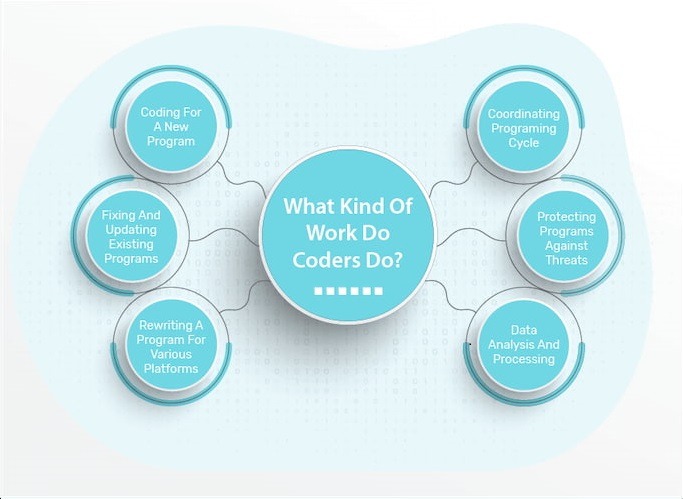
Writing Code for New Applications
Developers create software by writing, testing, and refining code. Some focus on front-end development (user interface), while others work on back-end development (server-side logic).
Fixing and Updating Software
Coders identify bugs, fix errors, and update software to improve performance. Keeping software functional and secure is essential.
Adapting Software for Different Platforms
Software must work on different operating systems. Developers rewrite code to ensure compatibility across multiple devices.
Managing the Development Process
DevOps engineers oversee software development, testing, deployment, and monitoring. They ensure smooth transitions between project stages.
Securing Software from Cyber Threats
Cybersecurity experts protect data from attacks. They use security tools and coding practices to detect and prevent cyber threats.
Processing and Analyzing Data
Data scientists use programming to analyze large data sets. They extract insights to help businesses make better decisions.
What are the Essential Skills for Coders?
To succeed in coding, you need technical and soft skills.
Technical Skills
- Programming languages (Python, JavaScript, Java, etc.)
- Problem-solving
- Algorithmic thinking
- Debugging and testing
- Database management
Soft Skills
- Adaptation,
- Effective communication,
- Teamwork and collaboration,
- Patience and persistence,
- Critical thinking.
Developing both technical expertise and the ability to work effectively with others is crucial for a successful coding career, which is why employers highly value soft skills.
What are the 5 Steps of Building A Coding Career?
Here’s a structured approach to building a successful coding career;
- Confirm your interest
- Choose a programming language
- Start learning
- Build projects
- Apply for jobs
Following these steps will help you gain the skills and experience needed to start an IT career path with confidence.
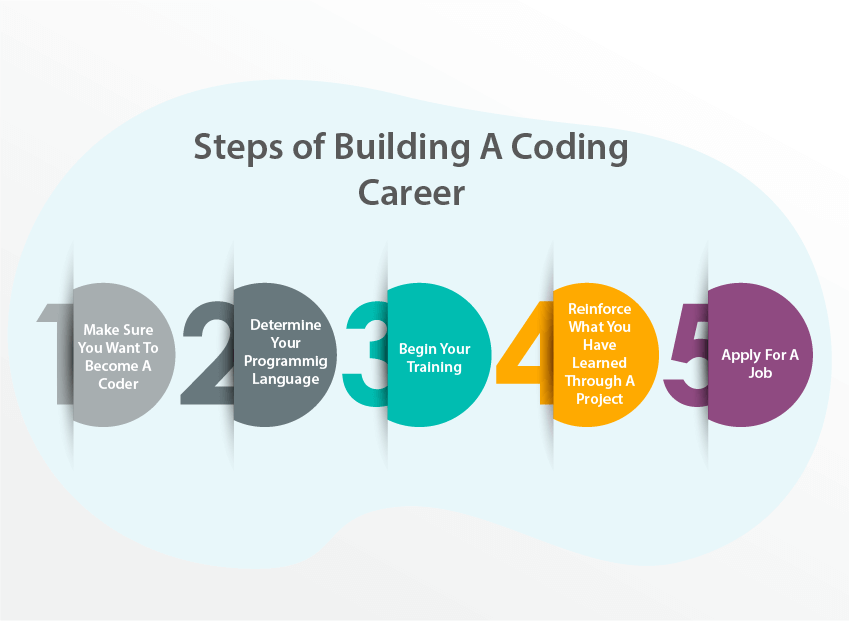
1. Confirm Your Interest
It’s essential to assess whether coding aligns with personal interests and career goals. This step helps ensure the motivation needed to tackle the challenges of learning to code and working in the tech field.
2. Choose a Programming Language
Pick a language based on your goals:
- Python – Data science, automation, web development
- JavaScript – Web development (front-end and back-end)
- Java – Enterprise applications
3. Start Learning
There are different ways to learn coding:
- Online courses – Self-paced learning
- Coding bootcamps – Intensive, job-focused training
- Personal projects – Practice by building real applications
4. Build Projects
Hands-on projects help you gain experience. A portfolio with real projects increases your job prospects.
5. Apply for Jobs:
Create a strong resume and LinkedIn profile. Prepare for coding interviews by practicing problems on platforms like LeetCode and HackerRank.
Pros and Cons of Becoming A Coder
Let’s look at some of the benefits and challenges in a coding career:
What are the 7 Benefits Of Becoming A Coder?
Here are the 7 benefits of becoming a coder;
- High Salary: Many coding jobs pay well.
- Job Satisfaction: Creating software is rewarding.
- Remote Work: Many coding jobs offer work-from-home options.
- No Degree Requirement: You can learn skills without formal education.
- Continuous Learning: Technology is always changing, keeping work interesting.
- Freelance Opportunities: Coders can work independently.
- Better Problem Skills: Coding teaches problem breakdown, useful everywhere.
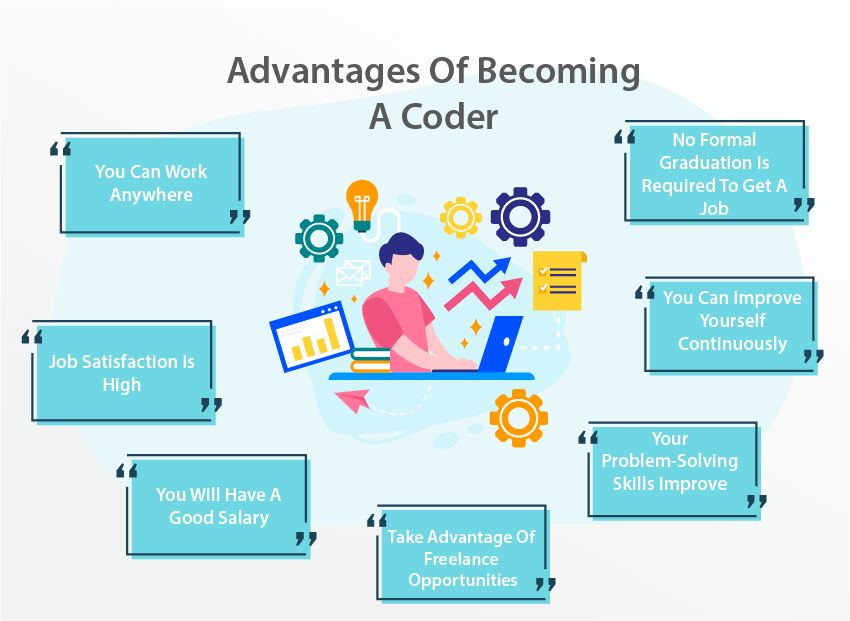
H3. What are the 3 Disadvantages Of Becoming A Coder?
Here are the 3 disadvantages of becoming a coder;
- Constant Learning: You must stay updated with new technology.
- Long Hours Sitting: Prolonged screen time can affect health.
- Repetitive Tasks: Some coding work can become routine.
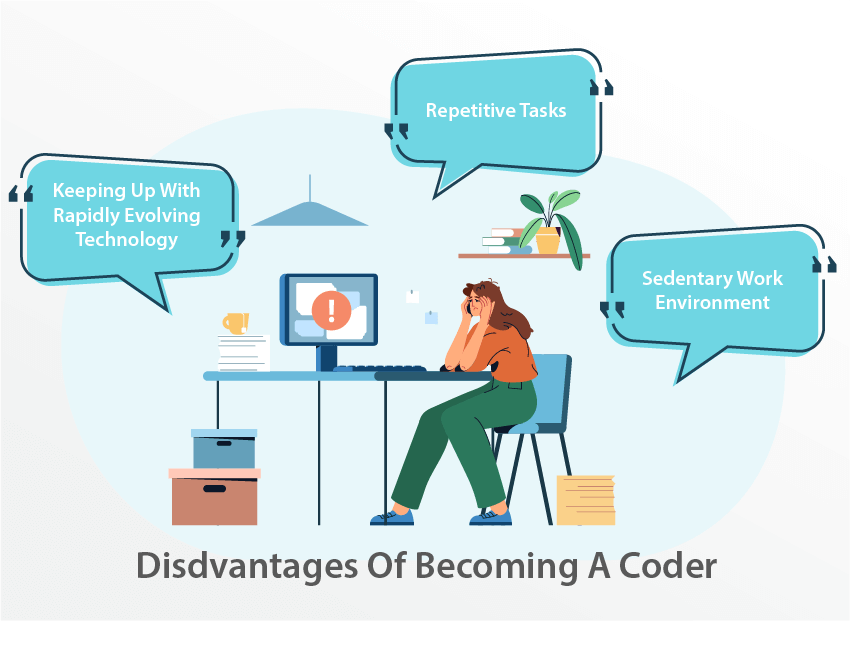
How Much Do Coders Earn?
The average salary for coding jobs is about $95,000 per year. Experienced coders in top positions can earn over $146,000, according to the Bureau of Labor Statistics (BLS). Demand for programmers continues to rise, making it a strong career choice.
For more information you can read our article titled “How Much Do Coders Make?”
Where to Find Coder Jobs Opportunities?
Here are four platforms to help you find coding jobs:
- Job boards
- Local job centers
- Coding Bootcamp Networks
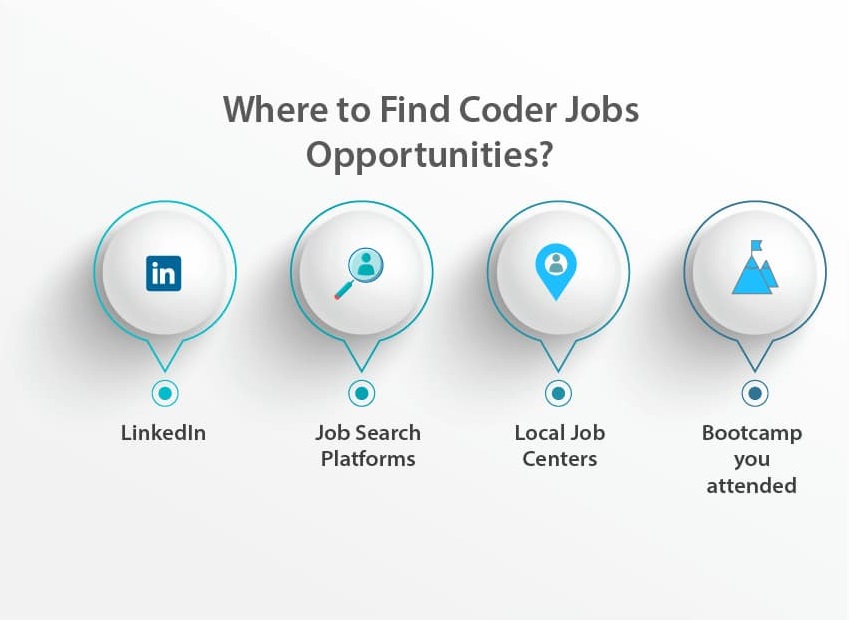
LinkedIn is a professional networking platform where coders can build profiles to showcase skills, connect with industry contacts, and apply to job postings. Employers and recruiters often use LinkedIn to find talent, making it a valuable tool for job searching and networking in the tech industry.
Job Boards
Job boards are websites that list job openings from various companies. Sites like Indeed, Monster, and Glassdoor allow coders to search for tech roles, filter by specific criteria, and directly apply online. Many job boards also offer insights into salary ranges and company reviews.
Local Job Centers
Local job centers or employment offices provide job listings and career resources, often focusing on local opportunities. Coders may find entry-level positions or internships here, making it a good resource for those looking for in-office roles or local opportunities.
Coding Bootcamp Networks
Many coding bootcamps have strong industry connections and offer job placement services to graduates. Bootcamps often connect students with hiring partners, provide exclusive job listings, and support graduates with resume reviews and interview preparation, enhancing the chances of finding a coding job post-graduation.
Become a Coder With Clarusway
Finally, you believe that you could become a coder without a graduation degree and then start a new career with the steps above. While reading this article, you may review Clarusway due to your bootcamp search.
Clarusway’s advanced training methods and expert trainers make your career preparation with the most accurate and practical techniques to make your dreams come true. No matter what age or business field you are in, come on then!




